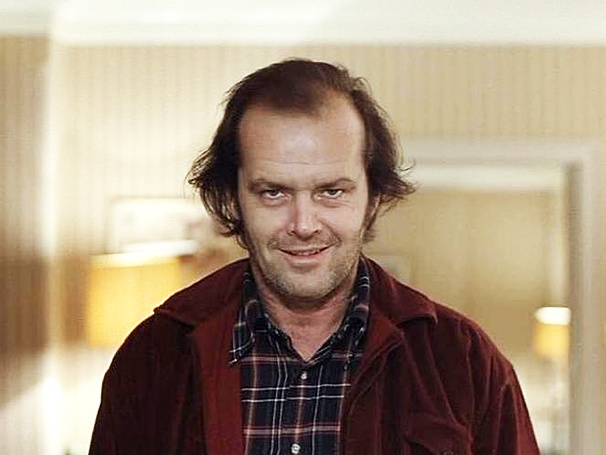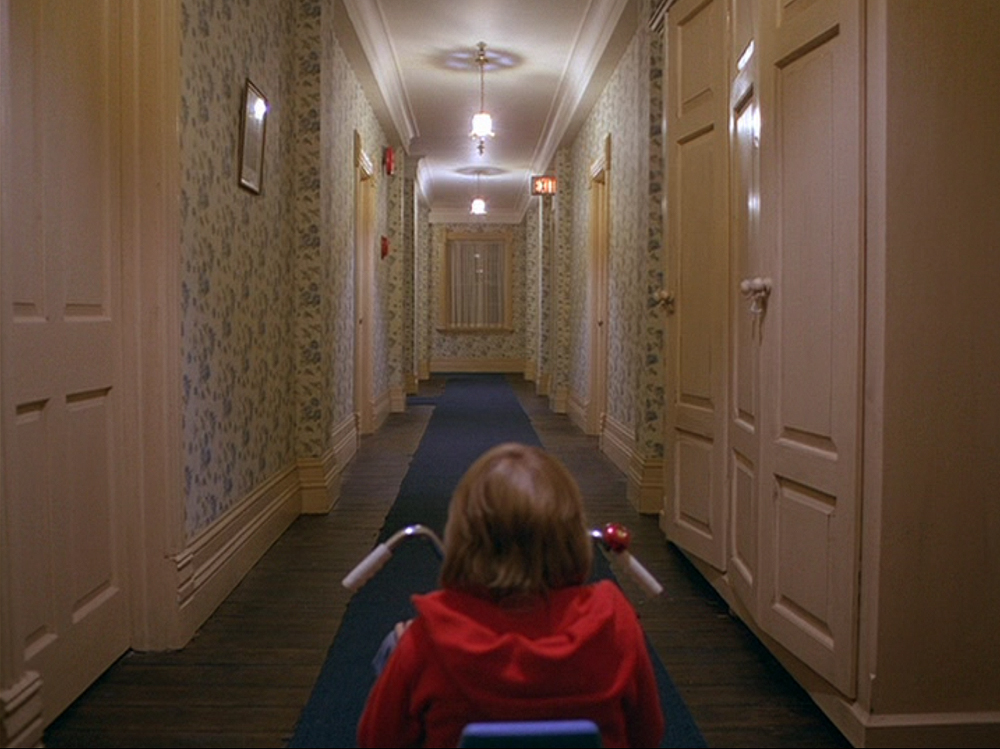The Shining
(In this review I have attempted to cover as little of the film in detail as possible, as I feel going into The Shining knowing little about it will increase its impact greatly)
Stanley Kubrick's The Shining has received praise from just about everyone it seems, becoming one of, if not the best, examples of the horror genre and a benchmark for all since. The extremely unsettling atmosphere that runs through it, coupled with the bursts of brutal violence and sickening tension, is a perfect lesson in how to unnerve an audience in ways that Paranormal Activity and Saw can only dream of. Of course, every film has its critics, chiefly Stephen King, author of the book, who described Stanley Kubrick's adaptation as like "a fancy car without an engine." It is understandable that it may not have been portrayed as he had imagined it though, with King later going on to create his own television adaptation (which was awful, so who had the last laugh there then?).

The story revolves around Jack Torrance (Jack Nicholson), his wife Wendy (Shelley Duvall) and his young son Danny (Danny Lloyd), who take up a job to maintain the Outlook Hotel during the winter months, when it is vacated due to the mountainous location and stormy weather, a potentially deadly combination. Jack, a recovering alcoholic and once promising writer, hopes to use the time to finish his play while Danny, who has a mysterious psychic ability, begins to experience ominous visions of the hotel's past. The optimistic opening swiftly begins to collapse, with Jack and Wendy increasingly drifting further apart from each other. Nicholson and Duvall are simply brilliant, with the former portraying a psychological breakdown with impressive depth and skill rarely seen elsewhere. His passive-aggressive nature and rapid mood swings (from calm to crazed in a matter of seconds) somehow makes his character ten times more haunting and psychotic than an axe wielding maniac. Jack is a vulnerable, psychologically distraught man who is ripped apart by paranoia, jealousy, bitterness and the hotel itself. However, for me Duvall is equally as excellent. She subtly depicts a wife who feels increasingly isolated and fearful, without ever becoming melodramatic. Both actors often express more in their body language than their words, something which can be said of the film as a whole.
 The design and cinematography plays a large part too, with the expensive but hauntingly empty rooms filled with a stifling claustrophobia, whether in the vast lobby or the pristine kitchen. As Danny explores the hotel on his tricycle, the camera follows closely behind him (using an innovative Steadicam that moves hauntingly smoothly), accompanied only by the rattle of the wheels. This reflects the atmosphere throughout the film, that something terrible is only just around the corner. The film is peppered with increasingly unsettling and disturbing images that don't need to be suddenly forced into the camera to have an impact. Instead, the camera lingers on them, burning the scenes into your mind. There are also the brief flashes of violent images that accentuate the increasingly unhinged characters.The typewriter scene is a particular favourite of mine as it epitomises the subtly disturbing psychological horror of the film. There is also very little music, with the main sound being shrill, shrieking strings that heighten the tension of the key scenes in a similar way to Psycho. In fact, with The Shining Kubrick masters tension in a way perhaps only Hitchcock did before him.
The design and cinematography plays a large part too, with the expensive but hauntingly empty rooms filled with a stifling claustrophobia, whether in the vast lobby or the pristine kitchen. As Danny explores the hotel on his tricycle, the camera follows closely behind him (using an innovative Steadicam that moves hauntingly smoothly), accompanied only by the rattle of the wheels. This reflects the atmosphere throughout the film, that something terrible is only just around the corner. The film is peppered with increasingly unsettling and disturbing images that don't need to be suddenly forced into the camera to have an impact. Instead, the camera lingers on them, burning the scenes into your mind. There are also the brief flashes of violent images that accentuate the increasingly unhinged characters.The typewriter scene is a particular favourite of mine as it epitomises the subtly disturbing psychological horror of the film. There is also very little music, with the main sound being shrill, shrieking strings that heighten the tension of the key scenes in a similar way to Psycho. In fact, with The Shining Kubrick masters tension in a way perhaps only Hitchcock did before him.
Quite simply, The Shining is one of the most haunting and memorable films to date. Kubrick's mastery of all genres is once again demonstrated here, putting his genius spin on the conventional horror film. The actors, camerawork, sets and sound all combine perfectly to deliver an unnerving and deeply unsettling piece that has yet to be matched.
Stanley Kubrick's The Shining has received praise from just about everyone it seems, becoming one of, if not the best, examples of the horror genre and a benchmark for all since. The extremely unsettling atmosphere that runs through it, coupled with the bursts of brutal violence and sickening tension, is a perfect lesson in how to unnerve an audience in ways that Paranormal Activity and Saw can only dream of. Of course, every film has its critics, chiefly Stephen King, author of the book, who described Stanley Kubrick's adaptation as like "a fancy car without an engine." It is understandable that it may not have been portrayed as he had imagined it though, with King later going on to create his own television adaptation (which was awful, so who had the last laugh there then?).

The story revolves around Jack Torrance (Jack Nicholson), his wife Wendy (Shelley Duvall) and his young son Danny (Danny Lloyd), who take up a job to maintain the Outlook Hotel during the winter months, when it is vacated due to the mountainous location and stormy weather, a potentially deadly combination. Jack, a recovering alcoholic and once promising writer, hopes to use the time to finish his play while Danny, who has a mysterious psychic ability, begins to experience ominous visions of the hotel's past. The optimistic opening swiftly begins to collapse, with Jack and Wendy increasingly drifting further apart from each other. Nicholson and Duvall are simply brilliant, with the former portraying a psychological breakdown with impressive depth and skill rarely seen elsewhere. His passive-aggressive nature and rapid mood swings (from calm to crazed in a matter of seconds) somehow makes his character ten times more haunting and psychotic than an axe wielding maniac. Jack is a vulnerable, psychologically distraught man who is ripped apart by paranoia, jealousy, bitterness and the hotel itself. However, for me Duvall is equally as excellent. She subtly depicts a wife who feels increasingly isolated and fearful, without ever becoming melodramatic. Both actors often express more in their body language than their words, something which can be said of the film as a whole.
 The design and cinematography plays a large part too, with the expensive but hauntingly empty rooms filled with a stifling claustrophobia, whether in the vast lobby or the pristine kitchen. As Danny explores the hotel on his tricycle, the camera follows closely behind him (using an innovative Steadicam that moves hauntingly smoothly), accompanied only by the rattle of the wheels. This reflects the atmosphere throughout the film, that something terrible is only just around the corner. The film is peppered with increasingly unsettling and disturbing images that don't need to be suddenly forced into the camera to have an impact. Instead, the camera lingers on them, burning the scenes into your mind. There are also the brief flashes of violent images that accentuate the increasingly unhinged characters.The typewriter scene is a particular favourite of mine as it epitomises the subtly disturbing psychological horror of the film. There is also very little music, with the main sound being shrill, shrieking strings that heighten the tension of the key scenes in a similar way to Psycho. In fact, with The Shining Kubrick masters tension in a way perhaps only Hitchcock did before him.
The design and cinematography plays a large part too, with the expensive but hauntingly empty rooms filled with a stifling claustrophobia, whether in the vast lobby or the pristine kitchen. As Danny explores the hotel on his tricycle, the camera follows closely behind him (using an innovative Steadicam that moves hauntingly smoothly), accompanied only by the rattle of the wheels. This reflects the atmosphere throughout the film, that something terrible is only just around the corner. The film is peppered with increasingly unsettling and disturbing images that don't need to be suddenly forced into the camera to have an impact. Instead, the camera lingers on them, burning the scenes into your mind. There are also the brief flashes of violent images that accentuate the increasingly unhinged characters.The typewriter scene is a particular favourite of mine as it epitomises the subtly disturbing psychological horror of the film. There is also very little music, with the main sound being shrill, shrieking strings that heighten the tension of the key scenes in a similar way to Psycho. In fact, with The Shining Kubrick masters tension in a way perhaps only Hitchcock did before him. Quite simply, The Shining is one of the most haunting and memorable films to date. Kubrick's mastery of all genres is once again demonstrated here, putting his genius spin on the conventional horror film. The actors, camerawork, sets and sound all combine perfectly to deliver an unnerving and deeply unsettling piece that has yet to be matched.
Comments
Post a Comment